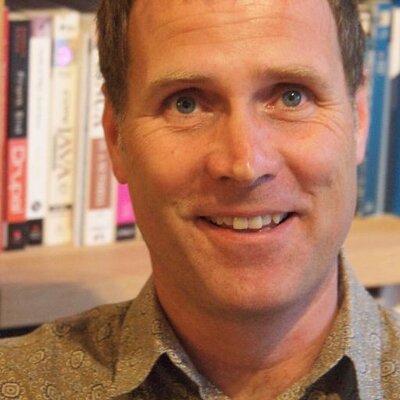 France’s policies on open source and open data are helping to create a market for French ICT service providers, says Didier Tranchier, Professor of Innovation Management at Institut Mines-Telecom, a research institute. Professor Tranchier, who coaches and invests in high tech companies, spoke at the Mindtrek OpenMind conference in Tampere (Finland) in September. “Open data, open content and open source have deep roots in France”, said Tranchier. “We started this in 1789.”According to Tranchier, there is a direct link between the government’s policies and the rapid growth of open source firms.
France’s policies on open source and open data are helping to create a market for French ICT service providers, says Didier Tranchier, Professor of Innovation Management at Institut Mines-Telecom, a research institute. Professor Tranchier, who coaches and invests in high tech companies, spoke at the Mindtrek OpenMind conference in Tampere (Finland) in September. “Open data, open content and open source have deep roots in France”, said Tranchier. “We started this in 1789.”According to Tranchier, there is a direct link between the government’s policies and the rapid growth of open source firms.
Latest News
Halamka on The ONC 2015 Certification Rule
 Just as I summarized the CMS Meaningful Use Final Rule last week, this week I’ll summarize the 560 pages of the ONC 2015 Certification Final Rule. Key points to understanding the rule include...The 2015 Certification Rule is decoupled from Meaningful Use. Thus, you’ll find functionality to support EHR Incentive Programs plus several certification criteria for long-term/post-acute care, chronic care management, behavioral health, and other programs such as merit-based incentive payments (MIPS).
Just as I summarized the CMS Meaningful Use Final Rule last week, this week I’ll summarize the 560 pages of the ONC 2015 Certification Final Rule. Key points to understanding the rule include...The 2015 Certification Rule is decoupled from Meaningful Use. Thus, you’ll find functionality to support EHR Incentive Programs plus several certification criteria for long-term/post-acute care, chronic care management, behavioral health, and other programs such as merit-based incentive payments (MIPS).
- Login to post comments
Open Source Software's Implications Beyond Software
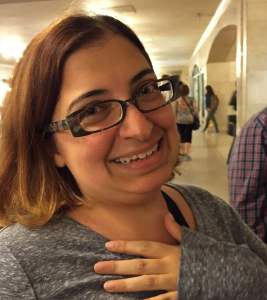 Jim Whitehurst, CEO of Red Hat, was sporting his awesome red shoes as he spoke to a crowded room at All Things Open last week. During his keynote on Day 1, he talked about how open source is a key part of the open organization, but what we're all looking to achieve has implications far beyond software. Jim began his keynote by explaining why there is a need for the principles of open source in business. If we think of the world we come from and the world we are coming into we see that there is a long line of change...
Jim Whitehurst, CEO of Red Hat, was sporting his awesome red shoes as he spoke to a crowded room at All Things Open last week. During his keynote on Day 1, he talked about how open source is a key part of the open organization, but what we're all looking to achieve has implications far beyond software. Jim began his keynote by explaining why there is a need for the principles of open source in business. If we think of the world we come from and the world we are coming into we see that there is a long line of change...
- Login to post comments
The Future Of Scientific Publishing: Let's Make Sure It's Fair As Well As Transparent
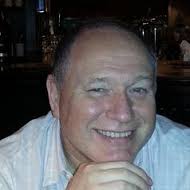 Scientific publishing has undergone a revolution in recent years – largely due to the internet. And it shows no sign of letting up as a growing number of countries attempt to ensure that research papers are made freely available. Publishers are struggling to adapt their business models to the new challenges. But it is not just the publishers who struggle. Peer-reviewed publications are extremely important for academics, who use them to communicate their latest research findings. When it comes to making decisions about hiring and promotion, universities often use an academic’s publication record. However, the use of publication consultants and increasingly long lists of authors in certain disciplines are changing the game. So where will it all end?
Scientific publishing has undergone a revolution in recent years – largely due to the internet. And it shows no sign of letting up as a growing number of countries attempt to ensure that research papers are made freely available. Publishers are struggling to adapt their business models to the new challenges. But it is not just the publishers who struggle. Peer-reviewed publications are extremely important for academics, who use them to communicate their latest research findings. When it comes to making decisions about hiring and promotion, universities often use an academic’s publication record. However, the use of publication consultants and increasingly long lists of authors in certain disciplines are changing the game. So where will it all end?
- Login to post comments
Halamka Summarizes the CMS Meaningful Use Final Rule
 I’ve been asked to summarize the 752 page CMS Meaningful Use Final Rule...Between the Notice of Proposed Rulemaking and the publication of the CMS Final Rule, the Medicare Access and CHIP Reauthorization Act of 2015 (MACRA) passed to include sunsetting the Meaningful Use payment adjustment for professionals at the end of 2018. Also, MACRA requires the establishment of a Merit-Based Incentive Payment System (MIPS) which would incorporate Meaningful Use. The comment period will be used in an attempt to align the Meaningful Use program and the MIPS program...Stage 3 is more controversial and I will focus on that.
I’ve been asked to summarize the 752 page CMS Meaningful Use Final Rule...Between the Notice of Proposed Rulemaking and the publication of the CMS Final Rule, the Medicare Access and CHIP Reauthorization Act of 2015 (MACRA) passed to include sunsetting the Meaningful Use payment adjustment for professionals at the end of 2018. Also, MACRA requires the establishment of a Merit-Based Incentive Payment System (MIPS) which would incorporate Meaningful Use. The comment period will be used in an attempt to align the Meaningful Use program and the MIPS program...Stage 3 is more controversial and I will focus on that.
- Login to post comments
Will The RIO Journal be the Most Open Scientific Publication?
 A large amount of scientific research is published in scientific journals, and there has been a lot of debate around offering open access to these articles, along with the underlying data, software, and methods. There is a new journal that launched recently with the goal of going beyond traditional scientific publishing by encompassing all outputs of the research cycle. What does this mean? The RIO Journal (Research Ideas and Outcomes) is launching with the goal of publishing a number of things not currently published, in addition to more conventional outputs on a single collaborative platform. This includes things such as project proposals, data, methods, workflows, software, project reports, and research articles.
A large amount of scientific research is published in scientific journals, and there has been a lot of debate around offering open access to these articles, along with the underlying data, software, and methods. There is a new journal that launched recently with the goal of going beyond traditional scientific publishing by encompassing all outputs of the research cycle. What does this mean? The RIO Journal (Research Ideas and Outcomes) is launching with the goal of publishing a number of things not currently published, in addition to more conventional outputs on a single collaborative platform. This includes things such as project proposals, data, methods, workflows, software, project reports, and research articles.
- Login to post comments
FASTR Ensures that Publicly Funded Research Belongs to the Public
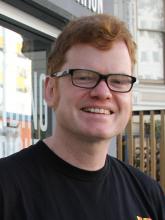 When taxpayers pay for research, everyone should have access to it. That’s the simple premise of the Fair Access to Science and Technology Research Act of 2015 (S.779, H.R.1477), or FASTR. If enacted, FASTR would keep federally funded research where it belongs, in the hands of the public. Under FASTR, every federal agency that spends more than $100 million on grants for research would be required to adopt an open access policy. Although the bill gives each agency some leeway in adopting a policy appropriate to the types of research it funds, each one would require that published research be available to the public no later than six months after publication.
When taxpayers pay for research, everyone should have access to it. That’s the simple premise of the Fair Access to Science and Technology Research Act of 2015 (S.779, H.R.1477), or FASTR. If enacted, FASTR would keep federally funded research where it belongs, in the hands of the public. Under FASTR, every federal agency that spends more than $100 million on grants for research would be required to adopt an open access policy. Although the bill gives each agency some leeway in adopting a policy appropriate to the types of research it funds, each one would require that published research be available to the public no later than six months after publication.
- Login to post comments
Health innovations need much more than research
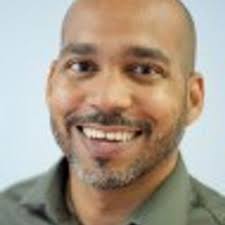 Previously known as the Global Forum for Health Research, the Global Forum for Research and Innovation for Health, held August 24-27 in the Philippines, has been freshly rebranded to reflect the distinction between research and the development of innovation as a product or service. This new title also acknowledges that health research is not the only research that affects health. Health outcomes are determined by a complex web of social, environmental and governance issues. A new multidisciplinary, cross-sectoral approach to research was referenced explicitly throughout the conference — often as a salutary example of the kind of collaboration that can help translate research into innovation.
Previously known as the Global Forum for Health Research, the Global Forum for Research and Innovation for Health, held August 24-27 in the Philippines, has been freshly rebranded to reflect the distinction between research and the development of innovation as a product or service. This new title also acknowledges that health research is not the only research that affects health. Health outcomes are determined by a complex web of social, environmental and governance issues. A new multidisciplinary, cross-sectoral approach to research was referenced explicitly throughout the conference — often as a salutary example of the kind of collaboration that can help translate research into innovation.
- Login to post comments
Is the 2015 Nobel Prize a turning point for traditional Chinese medicine?
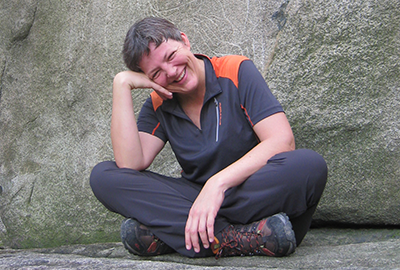 So the Nobel Prize is not only acknowledging this complete transformation of a Chinese herb through modern biomedical science into something powerfully efficacious, but also the millions of lives saved because of its successful application worldwide, particularly in the developing world. But there’s something else that marks Tu as extraordinary vis-à-vis both her two fellow Nobel Laureates for medicine, William C Campbell and Satoshi Ōmura, and her more Western medically oriented colleagues in pharmacology. She embodies, in both her history and her research, what I call medical bilingualism – the ability not only to read in two different medical languages but to understand their different histories, conceptual differences, and, most importantly for this unexpected news, potential value for therapeutic interventions in the present.
So the Nobel Prize is not only acknowledging this complete transformation of a Chinese herb through modern biomedical science into something powerfully efficacious, but also the millions of lives saved because of its successful application worldwide, particularly in the developing world. But there’s something else that marks Tu as extraordinary vis-à-vis both her two fellow Nobel Laureates for medicine, William C Campbell and Satoshi Ōmura, and her more Western medically oriented colleagues in pharmacology. She embodies, in both her history and her research, what I call medical bilingualism – the ability not only to read in two different medical languages but to understand their different histories, conceptual differences, and, most importantly for this unexpected news, potential value for therapeutic interventions in the present.
- Login to post comments
‘France's Open Source Policy Spurs ICT Market’
- Login to post comments
Open Source Day at Grace Hopper 2015
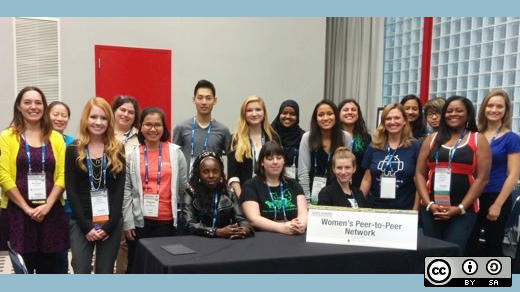 The 2015 Grace Hopper Celebration of Women in Computing (GHC) started out like any other, with a giant room filled with thousands of women with a passion for technology and computing. This year's welcome keynote opened with green lights strobing over a dark room. What a way to highlight the rows and rows of women ready to learn, connect, and join new communities. Telle Whitney, founder of GHC, was first to the podium and offered a heartfelt and sincere welcome message that brought a tear to my eye. She spoke of the women who built GHC from their vision of a better future, where women and men take equal part in technology, and of her diagnosis of an auto immune disease. But she's doing well she says, and thanked everyone for their thoughts and concern...
The 2015 Grace Hopper Celebration of Women in Computing (GHC) started out like any other, with a giant room filled with thousands of women with a passion for technology and computing. This year's welcome keynote opened with green lights strobing over a dark room. What a way to highlight the rows and rows of women ready to learn, connect, and join new communities. Telle Whitney, founder of GHC, was first to the podium and offered a heartfelt and sincere welcome message that brought a tear to my eye. She spoke of the women who built GHC from their vision of a better future, where women and men take equal part in technology, and of her diagnosis of an auto immune disease. But she's doing well she says, and thanked everyone for their thoughts and concern...
- Login to post comments